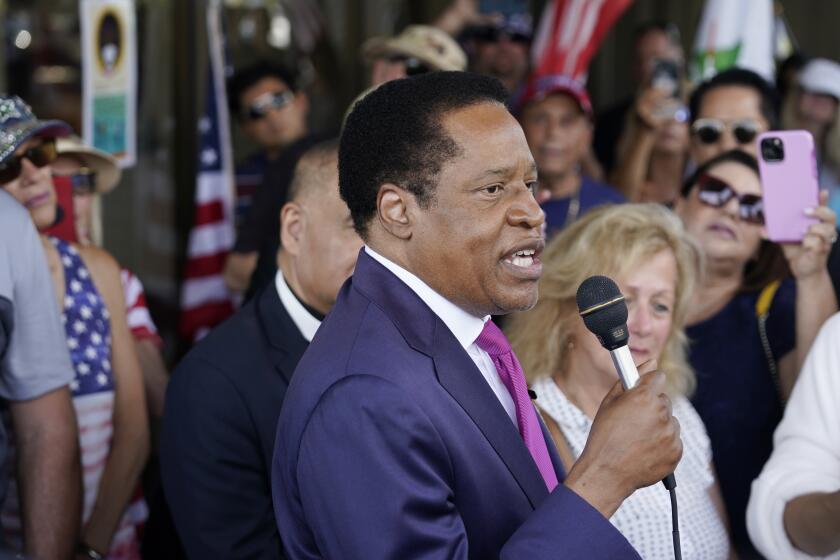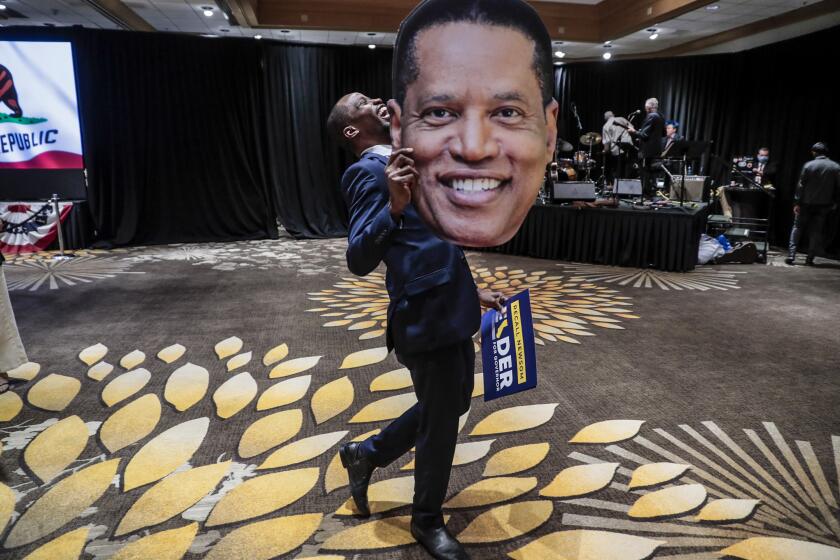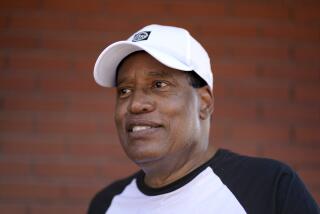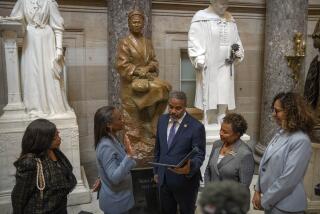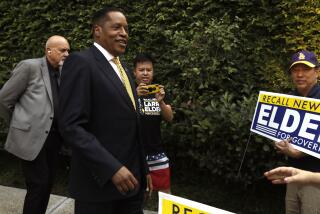Column: Win or lose, Larry Elder could bring about a new era of Black conservatism
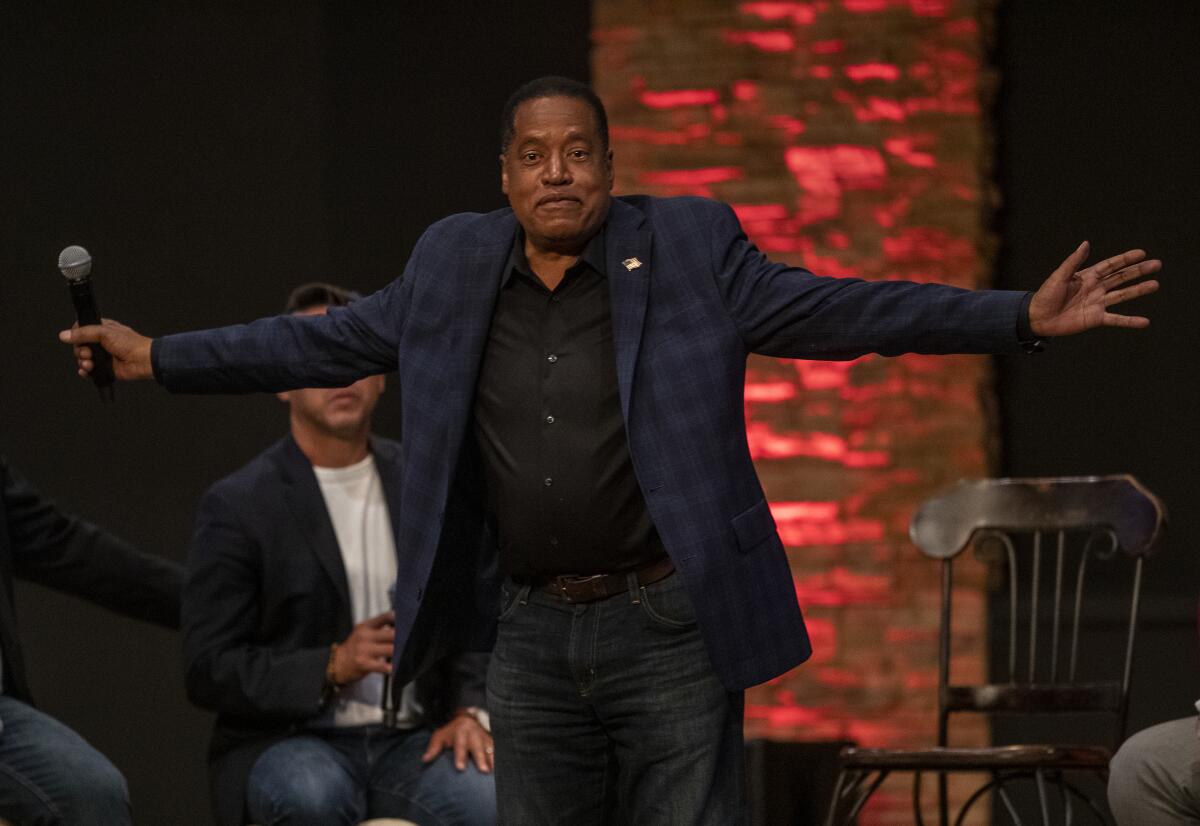
- Share via
Corrin Rankin is Black and conservative. She knows she’s a rarity, especially in California.
So, when the longtime political operative talks about her decision in 2019 to create the Legacy Republican Alliance, a political action committee designed to recruit Black people to the GOP, she does so with the measured optimism one might expect.
“We were like, let’s just start with the basics. First, let’s show people that there are Black people in the room,” Rankin told me from her home in Stockton. “You’ve got to crawl before you can walk.”
Or not.
On Tuesday, voters will decide whether a Black conservative named Larry Elder will become California’s next governor — an all-but-certain turn of events if Gavin Newsom gets recalled.
To suddenly go from struggling to find Black Republicans willing to run for minor offices to the possibility of having one lead the executive branch in Sacramento has been, in a word Rankin repeats often, “surprising.”
“Win or lose, it has gotten people to talk about what Black conservatism looks like,” said Rankin, vice chair of the Central Valley region for the California Republican Party. “And some people will say, yes, this is what it should look like. And some people will say, no, this is not what it should look like. But at the end of the day, we’re having that conversation now. We weren’t last year.”
Get the latest from Erika D. Smith
Commentary on people, politics and the quest for a more equitable California.
You may occasionally receive promotional content from the Los Angeles Times.
Jonathan Madison, a Black man and vice chair of the Bay Area region for the California GOP, put it more bluntly:
“I think it potentially paves the way for a number of other conservatives, particularly minorities, African Americans, to run for bigger office,” he said, “to dream big, to kind of pave the way for us to really have a voice.”
Skeptical? Me too.
After all, this is still California, where only about 6% of likely Republican voters are Black, according to the nonpartisan Public Policy Institute of California, and where the GOP is outnumbered 2 to 1 by Democrats.
We’re also talking about Elder, a candidate who, despite being raised in the ’hood of South Central Los Angeles, hasn’t tried very hard to court Black voters. He’s campaigning at churches, for example, but not Black churches.
He also doesn’t have many Black allies — at least not that have surfaced publicly. In fact, most prominent Black conservatives seem to be staying neutral on the recall and quiet about Elder, except for their praise of his hard work rising through the ranks of talk radio.
One exception is Johnnie Morgan, president of the California Republican Assembly, a conservative advocacy group that endorsed Elder.
Meanwhile, Tamika Hamilton, a Black conservative who is running against Democratic Rep. John Garamendi in Northern California, has endorsed Elder’s rival, Assemblymember Kevin Kiley.
Elder’s effort to replace Gavin Newsom feels like an insult to Blackness.
“More than ever, we need someone to bring everybody together,” Hamilton explained. “And as a [radio] commentator, sometimes you say things to get people riled up and I think a lot of the things that he’s said over the years don’t truly represent a message that’s going to bridge a gap and bring people together.”
That’s putting it mildly, in this Democrat’s opinion.
However, it is Elder’s very divisiveness, honed over his many years picking fights on the radio, that has put him in the singular position to break through politically where other Black conservatives have failed.
“He has the ability to sort of connect with people in a way that a lot of people just don’t have,” Madison said.
That’s also the undeniable opportunity of Elder’s insurgent campaign: His ability to get attention.
“What we need is someone who can communicate a direction of vision,” said Craig DeLuz, a Black man and spokesman for the California Republican Assembly. “Someone who can get people excited, but also create a statewide campaign that is going to have coattails for candidates down ticket. Because we need more.”
::
To understand who would actually want this kind of attention is to first understand how isolating it must be to be a Black conservative.
For decades, most Black Americans have leaned left, consistently supporting a robust government-run social safety net and voting for Democrats to protect it. Those Black Americans who have dared to dabble or veer completely right into Republican politics have either been shunned or lambasted for it.
“To a large degree, the Black community has been convinced that if you don’t vote Democrat, you aren’t Black,” DeLuz said. “If you’re a Black conservative, you’re constantly having to defend why you made the choice that you’ve made.”
“It’s almost like, ‘Oh, you’re the boogeyman,’” Hamilton added.
Such thinking has (understandably) become even more pronounced since Donald Trump was elected president, completing the transformation of the Republican Party into one welcoming of white supremacists.
So, these days, Black conservatives are thought of more as characters than real people.
Larry Elder shook up the recall campaign. What will the conservative talk radio host do next?
There are the smart but misguided sellouts. Think former U.S. Housing and Urban Development Secretary Ben Carson, U.S. Supreme Court Justice Clarence Thomas and Kentucky Atty. Gen. Daniel Cameron.
And there are the opportunistic hucksters and hangers-on. Think Omarosa Manigault Newman, Diamond and Silk, and Candace Owens.
Elder seems to take his inspiration from both categories. He’s both a graduate of an Ivy League university and a shameless media gadfly.
But Rankin, who was a member of the advisory board for Black Voices for Trump during the 2020 presidential campaign, insists there are other types of Black conservatives, too.
Pragmatic sorts who were drawn to Republican politics because of the party’s policies, and who rarely get attention because they aren’t pontificating on Fox News or Twitter. Instead, they are working behind the scenes with Democrats for their good of their communities.
“What can get lost in a high-profile race like this is that Black conservatism isn’t just represented by one person, right?” said Micah Grant, who has worked in communications for several Republican officials in Sacramento. “People may not believe this, but we’re still a very diverse bunch, many of whom are elected and who are looking to bridge gaps and govern and get things done.”
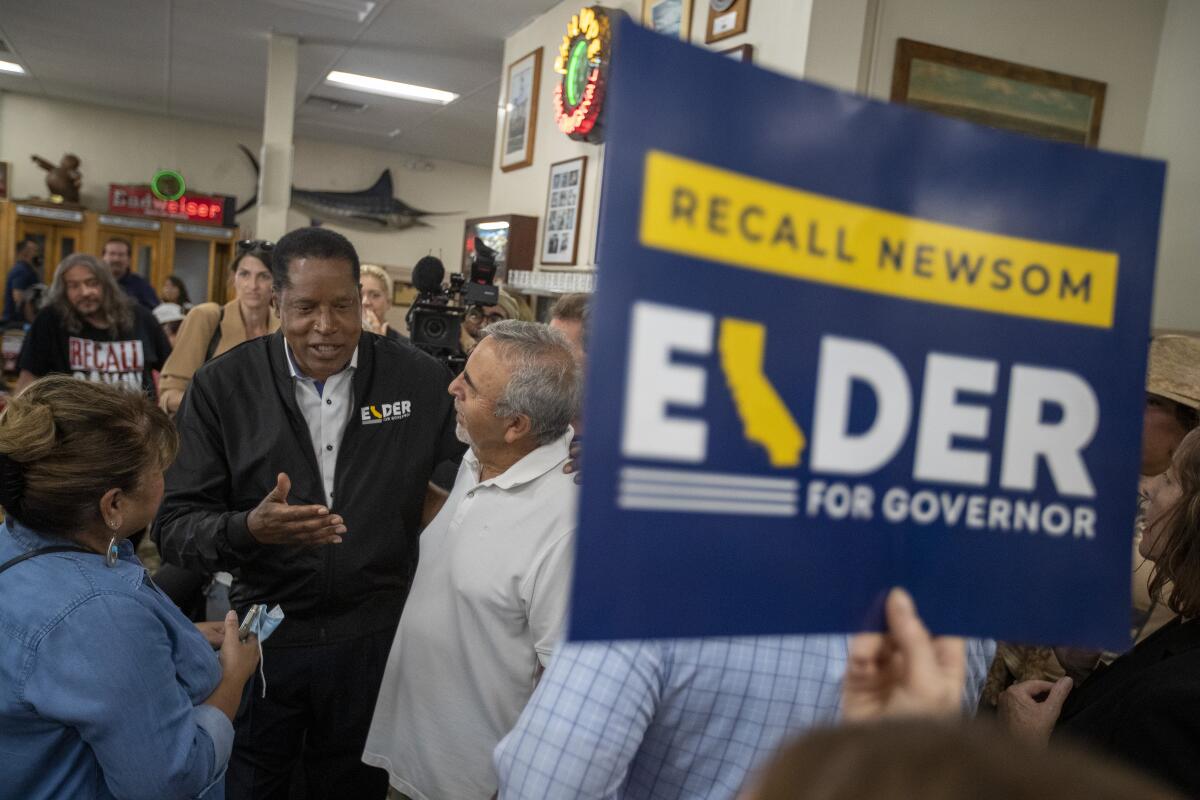
Grant, for example, also grew up in South Central and got into Republican politics, in part because he was offered an internship by former Gov. Arnold Schwarzenegger. Then he took a deeper dive into education policy.
“I had a lot of great teachers,” he said. “But at the same time, I think there’s a paradigm shift that needs to happen in California for the students of color particularly to be more successful. I found more of a home on the reform side of education and the Republican Party.”
Rankin switched parties after inheriting her family’s bail bonds business in Redwood City, wary of the criminal justice reformers. DeLuz cited his experience winning elected office in student government while attending Chico State, even though he was one of only a few Black students on campus. Hamilton, meanwhile, pointed to her “traditional family values” as a big reason for her party affiliation.
“There’s a broader picture,” Rankin said of her fellow Black conservatives.
The question is whether Elder, who built his career on trashing the Black community to entertain white listeners, is the right person to appeal to those more moderate, partisan-curious Black folks.
Or is he merely the person who will define Black conservatism in his hard-line image once and for all, inspiring even more Black Republicans of his bombastic ilk to run for elected office in the future? Shudder the thought.
As President Biden said of Elder while stumping for Newsom in Long Beach on Monday evening, “the leading Republican running for governor is the closest thing to a Trump clone that I have ever seen.”
::
Somehow, Rankin isn’t too worried.
“I understand the concerns from the Black community — I deeply understand,” she told me. “But in fairness to Larry, I have seen him begin to evolve from a shock jock into a candidate. I think that I would like to see him do more Black media.”
That would be nice.
“There really needs to be an understanding that should he be elected, this is California. This is not Texas,” she continued. “There should be a real deep understanding that you represent everybody, not just the people who voted for you.”
Going into Tuesday’s recall election, Elder’s support was highest among white and Latino Californians, according to a CBS News poll. Of the Black Californians polled, only 14% said they’d vote for him.
“I like to think of our party as a big tent,” Rankin said. “And I don’t feel like I have to agree with everything everybody says, [but] at the end of the day, I’m happy that there’s more Black Republicans. And I hope that they keep coming.”
More to Read
Get the latest from Erika D. Smith
Commentary on people, politics and the quest for a more equitable California.
You may occasionally receive promotional content from the Los Angeles Times.
